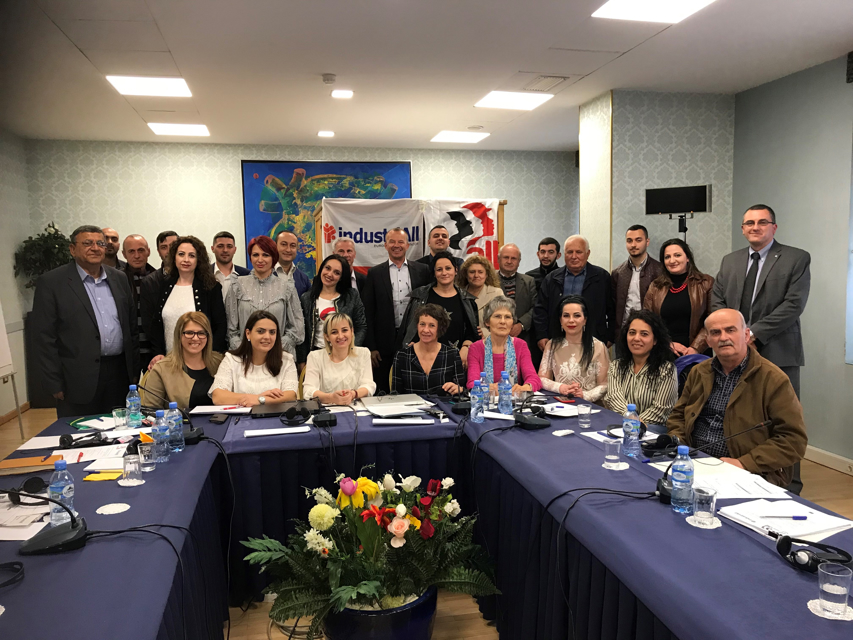It is unacceptable that workers in the Albanian garment and footwear industry have to survive with poverty wages
Official records show 51,000 workers in the textile, clothing, leather and shoe industries in Albania, with a 10 per cent growth in the past year. But there are tens of thousands of informal workers. According to a government estimate, informal economy makes up 50 per cent of the GDP in this European Union candidate country.
The two Albanian textile unions have some 3,000 paying members. Koco Jani from the BSPSH confederation says that the SPILT union has invested in organising, but workers are afraid especially in rural areas where there are few employment opportunities. Compared to other South-East European countries, workers are younger, on average just over 30 years, and 90 per cent are women. Once they find a better-paid job, they leave the textile industry.
The government has continued raising the minimum wage, but at 208 euros in 2019, it is the lowest in South-East Europe.
And there are other problems. Arben Seferaj, head of the Labour Inspectorate said that inspectors managed to visit 500 out of 1200 textile and footwear factories last year, and found wage payment delays, missing social contributions, bad working conditions and dismissals. Problems were exacerbated by the lack of unions in the workplaces.
That's why industriAll Europe, together with industriALL Global, is carrying out the EU-funded project: strengthening the capacity of trade unions in South-East Europe to improve wages and working conditions in the garment and footwear sectors.
The project targets seven countries; Albania, Bulgaria, Croatia, North Macedonia, Montenegro, Romania and Serbia. The latest training event took place in Tirana, Albania on March 27 and 28.
Kol Nikollaj, president of the KSSH confederation, emphasised the need to build a proper regulatory base in Albania. Even though some progress had been made thanks to talks with the EU, laws on trade unions, collective bargaining and conflict resolution were still missing. The textile industry should get a branch collective agreement and more company level accords.
The employer organisations agreed and demanded attention from the government. Kol Sinjari from Biznes Albania and Bardhi Sejdarasi from the National Union of Fason supported the idea of a functioning tripartite national council and an industry-level collective agreement on wages, health and safety, and other elements. Sejdarasi said that the employer side had now merged, covering a majority of textile and footwear factories, which had turned it into a representative partner.
Now the unions need to improve their representativity. Therefore, the first day of the seminar focused on training on organising and putting together an organising plan, based on a detailed mapping of the factories and brands present in Albania. They include GFA brands Inditex and ASOS, ACT members Arcadia, Bestseller, Next and New Look, and Benetton.
The three NGOs present at the seminar, the Gender Alliance, Center for Labour Rights and ICSE, pledged cooperation with the unions to improve the wages and conditions of workers.
Luc Triangle, industriAll Europe’s General Secretary said:
“As a Candidate Country for future EU membership, it is unacceptable that workers in the Albanian garment and footwear industry have to survive with poverty wages in a highly informal sector. This is first a responsibility of an ignorant government and second from global and European brands exploiting this lack of enforceable legislation and absence of decent working conditions and wages. industriAll Europe together with IndustriALL Global Union do not accept this reality and will continue its campaign and fight against these Albanian realities. It must change!”
Kemal Özkan, IndustriALL Global Union’s assistant general secretary said:
“Many of the issues raised at the meeting were related to the brand responsibility and their sourcing practices. Brands have to live up to their commitments. But we also need to make the government accountable for the high level of informality in the garment and footwear sector, the poor working conditions and inefficient labour inspection. There is an urgent need for raising workers’ awareness about their legitimate rights in Albania. Together with industriAll European trade union, we will support our affiliates in their fight for better wages and conditions in that sector.”

